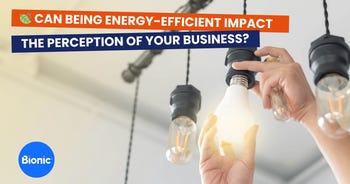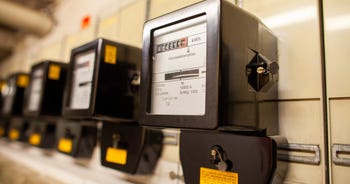How your small business can save energy during the summer
We all know that most UK homes and businesses use more energy during winter than summer - darker, colder weather means more gas and electricity is used for heat and light. But it's not always the case, as air conditioning, refrigeration and cooling costs can also add up in the summer.
Businesses of all sizes across the UK have been hit by increased energy bills in recent years. Although energy prices haven't been as volatile during 2025 and into 2026, rates remain high, and it's as important as ever to take control of your energy usage and costs, whatever the weather.
To help you identify energy-sapping equipment and habits, our guide will walk you through the reasons why usage can increase at this time of year and how you can cut your costs.

Five-point summary of our guide to saving energy in the summer
- Many UK small businesses see higher summer energy bills because air conditioning, refrigeration and cooling can use more electricity than winter heating in some workplaces.
- Energy prices have eased since the 2022 peak but still sit well above 2021 levels, so managing summer kWh usage is essential to protect cash flow and margins.
- Simple low‑cost changes, like using fans wisely, improving shading and ventilation, switching to LED lighting, fixing leaks and tackling “vampire” standby loads, can significantly cut summer demand.
- Upgrading to efficient cooling, improving insulation and controls, reviewing tariffs and using smart meters all help businesses manage seasonal peaks and avoid bill shocks.
- UK SMEs can also explore grants, discounts and low‑cost finance for energy‑efficiency projects, and use trusted comparison services like Bionic to find better‑value business energy contracts.
Why is it important to save energy during the summer?
For small businesses, cutting back on unnecessary costs is fundamental to maintaining a healthy bottom line. While this applies all year round, people may assume that less energy is used in summer due to warmer temperatures and less reliance on heating and lighting. But, businesses should look at how they can make energy efficiencies throughout the year, regardless of the weather.
Additionally, summer is when sustainability and environmental concerns come to the fore, as each year, global warming causes temperatures to reach record-breaking heights. As the planet continues to grapple with climate change, every business has a responsibility to reduce its carbon footprint.
High energy consumption leads to higher greenhouse gas emissions, increasing global warming. Therefore, adopting energy-saving measures during the summer months is not only a smart economic move but also an ethically and environmentally responsible one, too.
Summer efficiency is also about comfort and productivity. Keeping offices and shops cool in smarter ways can help staff stay focused, and customers stay longer, without sending your bills through the roof.
Why are energy bills so high?
To better understand why energy bills are still high, we need to look at the broader energy market and how the buying and selling of energy influences prices. The price we pay for energy isn’t just the simple cost of generating electricity or gas - it’s affected by a complex number of factors, as outlined below:
- Supply and demand – Energy prices are affected by supply and demand. During times of high demand or short supply, prices tend to rise. Likewise, when there's an oversupply or reduced demand, prices can decrease. With geopolitical tensions causing import difficulties to the UK in 2022, energy prices reached sky-high levels and remained volatile. Prices have since fallen and stabilised, but rates are still much higher than in 2021.
- Renewable energy – The transition from fossil fuels to renewable energy sources also influences energy prices. Investment in renewable energy infrastructure, research, and development requires significant capital, which is often reflected in energy prices. If renewable energy, like solar or wind power, isn’t generating enough power, the Grid is balanced using gas-powered generation, which increases wholesale prices and the rates we pay. Find out more about renewable energy for businesses with our guide.
- Taxes and levies – Taxes, levies, and regulatory costs can also contribute significantly towards energy bills. Governments often impose these charges on energy providers to fund renewable energy initiatives, energy efficiency schemes, and to maintain the energy grid's infrastructure. These green taxes are then passed on to businesses that purchase energy from the suppliers. The latest of these is the RAB Nuclear Levy.
- Low energy market security – With so many factors affecting business energy bills, the high chances of volatility within the market mean that prices can dip and soar quickly. If several of the above conditions occur at the same time, it puts even more strain on energy suppliers, and businesses will end up having to pay the consequences.
- Geopolitical instability - Although there were several causes of the 2022 price spikes, Russia's invasion of Ukraine was one of the main catalysts. Current prices are relatively stable, but we're already seeing signs of returning volatility due to instability in the Middle East.
To learn more about the circumstances that can cause energy prices to rise, take a look at our guide to what’s causing your gas bill to rise here.
Even as wholesale markets stabilise, non‑commodity costs like network charges and policy levies still make up a significant chunk of the unit rate on your bill, which limits how far prices can fall.
The impact of these factors often shows up as higher standing charges as well as unit rates, so keeping an eye on contract structure is just as important as watching the headline price per kWh.
Why are my business energy bills so high in the summer?
Many businesses can expect energy usage to increase in winter when it gets darker earlier and more power is used to keep the lights on for longer and for heating. But your bills could actually reach their highest in the summer.
This is because energy consumption can spike due to air conditioning, cooling, and ventilation systems being used, sometimes more often than heating in winter, to create comfortable working conditions. Air conditioning units, in particular, consume a significant amount of electricity, leading to higher energy bills.
This surge in demand not only leads to higher energy bills but also puts pressure on the power grid, often leading to higher energy prices for everyone.
In a typical UK office or retail space, poorly controlled air conditioning (AC) can easily add tens of pounds a month to electricity costs during a warm spell, especially if units are set too low or left running out of hours.
Refrigeration, IT equipment, commercial kitchens and cold‑rooms can also push up summer usage, so it’s worth looking beyond AC alone when analysing your usage.
How can my business reduce its energy consumption during the summer?
Making even a few small changes to the way you use energy can have an impact on your bills. Here are a few ways to cut your usage and your costs.
Use water efficiently
Heating water accounts for a significant amount of energy usage. Consider low-flow taps and fix any leaks promptly to avoid wasting water and energy. You can also encourage employees to only run any water-using appliances, like dishwashers or washing machines, with full loads and at cooler temperatures. To go one step further, consider investing in water-efficient appliances that run using less energy without compromising performance.
Use fans where possible
Fans consume less energy than air conditioning systems. In the UK, as the warmest months in the year don’t tend to last for too long, choosing a fan can save your business a lot more money than purchasing, installing, and running air conditioning.
Using fans that are closer to floor level will help to circulate cooler air around your office spaces, as opposed to blowing hot air that has risen to the top of the room. However, always remember to turn them off when spaces are unoccupied.
Where you do use AC, try setting thermostats to around 23 to 25°C rather than very low temperatures. Each extra degree of cooling can noticeably increase running costs.
Keep the hot air out
It may feel natural to crack open a window when the midday heat hits, but this can have the opposite effect. Opening a window or door allows hot air from outside to enter. Instead, try to keep them shut and use curtains or blinds to block out sunlight, which can cause temperatures to rise.
Simple measures like reflective blinds, external shading and closing south‑facing blinds before the hottest part of the day can dramatically cut heat from the sub and reduce the need for mechanical cooling.
Switch to LED light bulbs
Upgrading to energy-efficient lighting with light-emitting diodes (LEDs) can use up to 80% less energy than traditional fluorescent light bulbs and may last up to 25 times longer. They also emit less heat, which can reduce the need for cooling.
Unplug anything that’s not being used
Many appliances consume energy if they’re plugged in at the wall but not in use or even turned on: also known as vampire energy or phantom power. A study by British Gas even found that vampire energy can account for up to 23% of an electrical bill. To combat this, you can encourage employees to unplug chargers, turn off computers, and shut down equipment at the end of the day.
Replace air filters
If your offices are not optimally insulated or have outdated, inefficient cooling systems, you may be losing energy and, in turn, money. Older air conditioning systems or those not regularly serviced may have to work harder to cool the building, leading to increased energy use. Clean or replace filters at least once every three months during peak usage times to ensure your system operates efficiently.
Use energy-efficient equipment
Whenever possible, opt for equipment and appliances with a high energy-efficiency rating. They may have a higher upfront cost, but they should save you money in the long run through reduced energy consumption.
When upgrading, look for products with good SEER (Seasonal Energy Efficiency Ratio) ratings for cooling and use smart plugs or timers to avoid equipment running when no one is on site.
Switch business energy suppliers
Market competition means there may be more cost-effective energy deals available. Here at Bionic, we compare business energy suppliers and find a contract that's better tailored to your business's needs and usage patterns.
To find out how much you could save by switching, get in touch with our experts today or find out more about business energy here. Having a recent 12‑month usage profile to hand, ideally from a smart meter, can help ensure any new tariff matches how your business uses energy across summer and winter.
Are energy prices supposed to go down in 2026?
Forecasting energy prices can be difficult, as they depend on many variables, and the recent market volatility makes it nearly impossible to tell what could happen next.
Despite a levelling off of prices in 2025, short-term fluctuations can never be ruled out due to the factors mentioned above. Energy bills overall are still higher than they used to be before the COVID-19 pandemic.
And the way energy is bought and sold means that a drop in wholesale prices (the rates suppliers pay for the energy they sell to you) won't immediately be passed on.
Businesses should stay informed and responsive to these changes to avoid getting into difficult financial situations.
The best proactive approach to energy management during these uncertain times is to review your energy contract regularly, look for the most cost-effective options, and make everyday changes to cut your energy bill.
Checking renewal windows, avoiding out‑of‑contract rates and considering fixing for longer when prices dip can all help smooth the impact of future summer spikes.]
What support is available for small businesses?
Looking for alternative ways to support your business while energy bills continue to cost a substantial amount of money can reduce pressure on your cash flow. Here are some things you can do:
Energy efficiency grants and loans
There are various government-run programs and schemes that offer financial support to businesses looking to reduce the cost of their energy bills. One of the most popular schemes for businesses is the Energy Bills Discount Scheme (EBDS), which offers discounts on non-domestic electricity and gas rates. As long as your unit rates, which are measured in kWh, are above the minimum threshold, you could be eligible to receive a discount.
Find out about your eligibility for other small business grants.
Support schemes change over time. It’s always worth checking the latest business energy grants and schemes on the government website or by speaking to an adviser before you make plans.
Energy audits
Many utility companies provide free energy audits to businesses. These audits can identify areas where energy is being wasted and suggest improvements, helping to increase your efficiencies and cut your consumption rate.
If your energy provider doesn’t offer this service, independent auditors can also conduct them – or you can even carry one out yourself to save money. Find out how to conduct an energy audit for your business here.
Training and resources
There are lots of free or low-cost training and resources to help businesses understand and reduce their energy usage.
To start, you can visit the Energy Efficiency for Businesses site, which is part of the gov.uk website. There, you’ll find a list of money-saving tips and actions to help you on your journey of reducing your energy usage.
The UK Business Climate Hub also provides lots of detail on how businesses can tackle climate change by becoming ‘net zero’. Net Zero refers to balancing out the greenhouse gases we produce by taking steps to remove the same amount of CO2 from the atmosphere.
Green certification
Green business certifications are a way to certify that a company complies with verified sustainable practices, whether that’s by producing eco-friendly products, delivering goods in a carbon-neutral manner, or actively mitigating their environmental impact.
Green certifications are awarded by a number of different certifying bodies, such as the UN Global Compact, Green Mark, and B Corp. Each body will have its own regulations for awarding certifications, with criteria ranging from employee count to profit turnover.
While having a green certification won’t directly reduce your energy costs, it can help to boost your business's reputation and potentially attract more customers. This, in turn, can lead to more sales and more profit for your company.
Having a green certification is also a great way to prove that your business really is adopting a sustainable approach and can reduce the chances of being accused of greenwashing.
Demonstrating that you actively manage summer energy use, for example, through monitoring, targets and upgrades, can also support ESG reporting and strengthen future funding applications.
Cut your business energy bills with Bionic
Whether you’re a start-up or a growing business, getting stung by increasing energy bills can cause significant setbacks for your future. From understanding how to lower your electrical usage to knowing how you can seek help, our guide can help.
Get in touch with our friendly Bionic team to discuss your business energy needs today.
FAQs on how your small business can save energy and money during summer
Here’s an at-a-glance guide to some of the most frequently asked questions on how businesses can save energy and money during summer:
Why are my UK business energy bills higher in summer than winter?
Summer bills can be higher if your UK business uses lots of air conditioning, refrigeration or cooling, which can use more electricity than winter heating in some workplaces.
How much does air conditioning cost a small UK business to run in summer?
Depending on system size and tariff, running office air conditioning in the UK can easily cost tens of pounds a month during warm weather if it is used for long hours or set too low.
What is the cheapest way to keep my UK office cool in summer?
Using fans, good ventilation, blinds and sensible thermostat settings is usually cheaper than relying on air conditioning alone for cooling UK offices.
How can a UK shop or salon cut summer energy usage without making customers uncomfortable?
Shops and salons can use shading, keep doors closed, switch to LED lighting and run AC at moderate temperatures to stay comfortable while cutting summer kWh.
Do UK businesses save money by switching to LED lighting in summer?
Yes, LEDs use far less electricity and give off less heat than traditional bulbs, which reduces both lighting costs and the need for cooling in summer.
Are there any UK grants to help small businesses improve energy efficiency in the summer?
Small businesses in the UK may be able to access changing grants, loans or discount schemes for energy‑efficiency upgrades, which are listed on GOV.UK and local authority sites.
How often should my UK business service air conditioning to keep bills down?
Most UK businesses should clean or replace filters at least every three months in summer and follow manufacturer or engineer advice for regular servicing to keep the AC efficient.
How can Bionic help my UK small business cut summer energy bills?
Bionic compares business energy deals for UK SMEs and can help you find a tariff and contract that fit your usage pattern while you put summer energy‑saving ideas into action.








